
This story originally appeared on Roofstock and was produced and distributed in partnership with Stacker Studio.
States with the lowest property taxes
Ask any homeowner about expenses and they'll tell you: If you're a first-time buyer, you need to carefully calculate the total cost of owning a home before taking the plunge into homeownership.
Owning a home comes with dozens of additional costs, from mortgage payments and interest to upkeep, renovations, and household utility bills. It doesn't take long before expenses costs add up—especially when they come on top of potential property tax costs.
To determine which states offer the lowest in property taxes, Roofstock analyzed 2021 data from Wallethub and the U.S. Census Bureau. Costs were then determined for real estate property tax rates, median real estate tax payments, and median home prices for every state and Washington D.C. These amounts were then contextualized with what first-time homebuyers need to know about property taxes.
In some states, the high cost of property taxes can cause a home with an otherwise affordable price tag to be well out of someone's price range. In others, the low cost of property taxes could give you a little more wiggle room in your budget—which is never a bad thing.
If the idea of weighing the estimated costs of property taxes seems overwhelming to you, start by looking at the states with the lowest property taxes listed below. The list is reverse-ordered by effective real estate tax rate, with Hawaii as the state with the lowest property taxes, though the results would look different if it was ordered by the taxes on the state's median home. Whether you're looking for a dream home or next big investment, owning a home comes with several additional costs, property taxes being one of them.
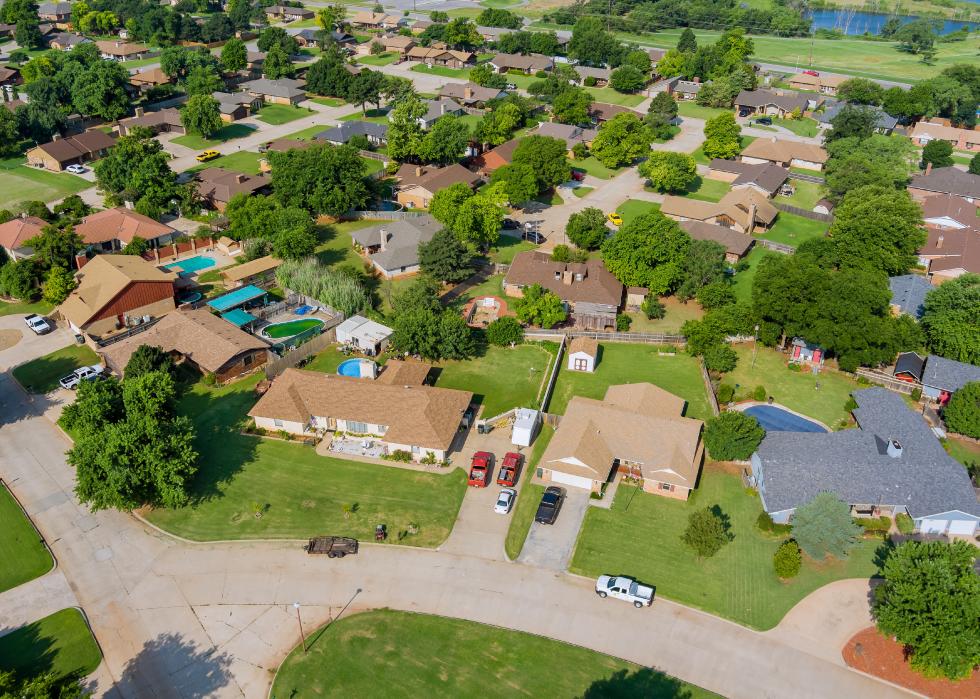
#25. Oklahoma
- Effective real estate tax rate: 0.90%
- Annual taxes on $217.5k home: $1,952
- Oklahoma's median home value: $136,800
- Annual taxes on Oklahoma's median home: $1,228
The state of Oklahoma offers home buyers affordable housing prices overall, and it also offers surprisingly low property taxes, too. The low real estate taxes in this state has helped to attract a slew of new buyers and transplants from areas with much higher tax rates, making Oklahoma a hot commodity for people who want to cut down on what they're shelling out in real estate taxes.
Part of the reason property taxes are low in this state is that while real estate taxes are typically the main source of revenue for many local governments across the nation, that's not necessarily true in Oklahoma. In this state, local governments may use property taxes only to pay the debt on bonds approved by voters; under the Oklahoma Constitution, property tax hikes are limited for each government and purpose. Plus, most rate increases require voter approval, which means that the control is primarily in the hands of the general public—not the local governments.

#24. Florida
- Effective real estate tax rate: 0.89%
- Annual taxes on $217.5k home: $1,934
- Florida's median home value: $215,300
- Annual taxes on Florida's median home: $1,914
Real estate taxes in Florida are low compared to many other states, and for good reason. Florida does not collect any property taxes, which helps to keep the real estate tax burden low in many areas. That said, local governments assess real estate taxes on the county level and counties receive a lot of their funding through these taxes. Florida property taxes, therefore, vary dramatically from county to county with some residents paying significantly more than the state average.
Homeowners in West Palm Beach paid a 2021 real estate tax rate of 4.96% on property, which is about five times the state average. However, there are certain statewide exemptions—like homestead exemptions and active duty and veteran exemptions—that can help reduce the costs of real estate taxes for Florida homeowners.
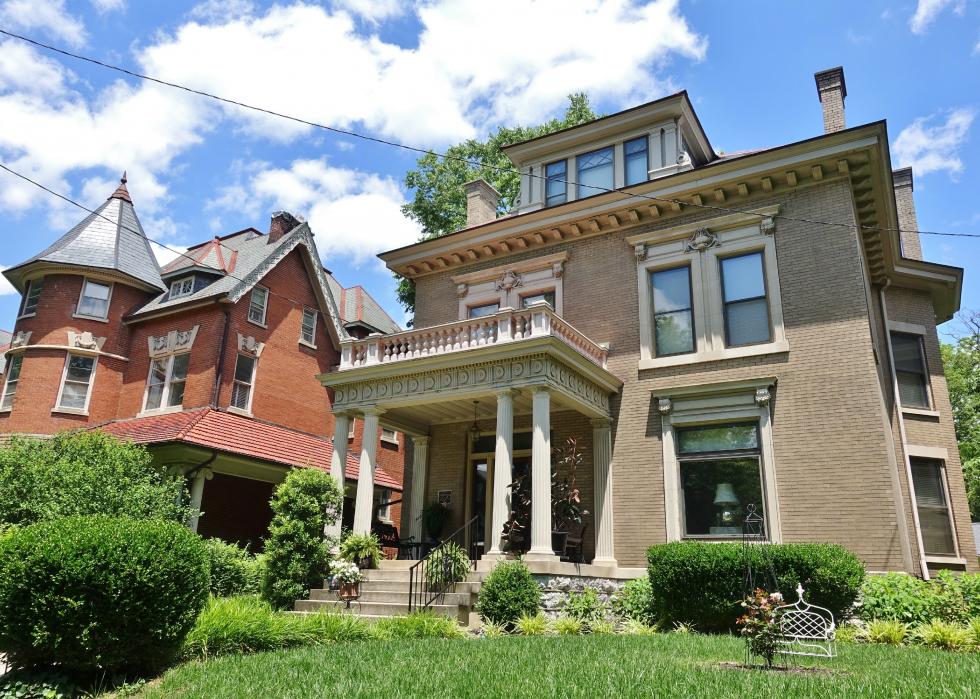
#23. Kentucky
- Effective real estate tax rate: 0.86%
- Annual taxes on $217.5k home: $1,866
- Kentucky's median home value: $141,000
- Annual taxes on Kentucky's median home: $1,210
Unlike many of the states on this list, the property tax in Kentucky is assessed on a state and local level. In many cases, having a state and local real estate tax to pay would increase the cost of real estate taxes overall for homeowners. That's not the case for Kentucky, thanks to a unique state law that requires the state real property tax rate to be reduced anytime the statewide real property assessment total exceeds the previous year's assessment totals by more than 4%. That law has been responsible for the state real property tax rate declining from 31.5 cents per $100 of assessed valuation to just 12.2 cents.
That said, each county in Kentucky determines what the property tax will be for the towns and cities within the county limits. However, most counties in the state are limited by law on the increases that can be made to property taxes each year—at least without either a public hearing or a recall petition—which helps to keep the overall tax rate low in the state.

#22. Indiana
- Effective real estate tax rate: 0.85%
- Annual taxes on $217.5k home: $1,853
- Indiana's median home value: $141,700
- Annual taxes on Indiana's median home: $1,207
As with many other states, what Indiana residents pay for property taxes will vary significantly from county to county. That's because real estate taxes in Indiana are assessed on a county and local level, with each local government setting the tax rate for their jurisdiction. Residents of the more populous counties, like Marion County, which is home to the metro area of Indianapolis, pay significantly more than the state average for real estate taxes. Luckily, there are a number of state exemptions that residents in counties with higher real estate taxes can use to cut down on the costs of their tax bills, including the standard homestead deduction and a supplemental homestead deduction.
The funds from real estate taxes in this state are used to help fund local governments and are used to pay for a variety of services, from welfare to building maintenance and construction, police and fire department costs, and local infrastructure and operating costs.
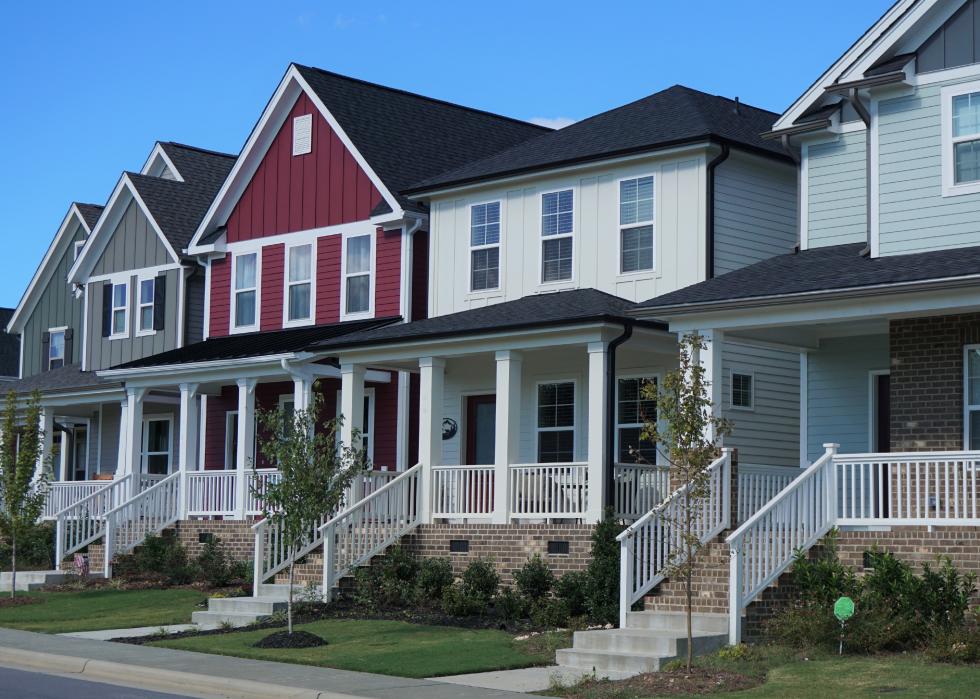
#21. North Carolina
- Effective real estate tax rate: 0.84%
- Annual taxes on $217.5k home: $1,833
- North Carolina's median home value: $172,500
- Annual taxes on North Carolina's median home: $1,454
While real estate tax rates are low overall in North Carolina, the property tax in this state is "ad valorem," meaning what you pay is based on the value of your property at the county level. A county assessor is responsible for determining the value of the properties in the area, and properties in this state must be revalued at least every eight years. As a result, if the current market value of your property increases after the county appraiser revalues it, you'll be stuck with a higher tax bill.
The good news, however, is that there are certain exemptions that can cut down on the total real estate tax bill, and there's also an appeals process for revaluations that owners deem too high. That helps to keep the total real estate rate for this state generally low, as do the counties within North Carolina that are taxed at a much lower rate than the metro or more populous—or high dollar—areas.

#20. Montana
- Effective real estate tax rate: 0.84%
- Annual taxes on $217.5k home: $1,818
- Montana's median home value: $230,600
- Annual taxes on Montana's median home: $1,928
The real estate taxes in Montana are some of the lowest in the nation, and there are a few different reasons for it. For starters, the property tax system was created to reduce the tax burden on homeowners. If an owner occupies the property, they pay taxes on a fraction of the property's market value. Plus, the commercial and business property is also eligible for significant exemptions, which helps to further reduce the real estate taxes in the state of Montana.
There are counties in Montana that pay more, on average, for real estate taxes than other counties. That's because the cities, counties, and school districts are what determine tax rates in the state, which causes the rates to vary, sometimes significantly, from one county or district to the next. Overall, though, the low real estate tax rate in the state of Montana has been a draw for new residents from more tax-heavy states who are looking to cut down on the costs of what they pay to own property.

#19. Virginia
- Effective real estate tax rate: 0.82%
- Annual taxes on $217.5k home: $1,779
- Virginia's median home value: $273,100
- Annual taxes on Virginia's median home: $2,234
Virginia's low property taxes come as a surprise when contrasted against the fact real estate there has to be revalued by local assessors on a regular basis. According to state law, cities with more than 30,000 residents must reassess the value of real estate every two years, and counties with more than 50,000 residents must reassess the value of real estate every four years. What that means is that residents are regularly subjected to the possibility of their home values—and therefore their real estate tax bills—increasing every few years.
What helps to keep the overall real estate tax rates low in the state is a law that limits a tax district to no more than a 1% increase because of a reassessment, so areas with historically low tax limits tend to stay that way. However, taxes on individual properties can increase by any amount: Residents of traditionally high-dollar areas like Alexandria City and Fairfax County typically pay real estate taxes that are much more in line with the national average.

#18. Mississippi
- Effective real estate tax rate: 0.81%
- Annual taxes on $217.5k home: $1,751
- Mississippi's median home value: $119,000
- Annual taxes on Mississippi's median home: $958
Real estate taxes in Mississippi are determined by local tax authorities based on the home values in the individual counties, cities, or districts, which means the tax rate varies significantly from county to county. The overall real estate tax rate is low across the state of Mississippi, in major part, because home values are relatively low in the state—with the average median home price clocking in at just under $120,000.
Mississippi also has a number of real estate tax rules that also help to keep the overall property tax burden low across the state. For example, owner-occupied residential properties are assessed at a value that is equal to 10% of market value, which helps to cut down on what homeowners pay for property taxes. The rate for all other real estate is just 15% of the market value. Statewide exemptions, including a homestead exemption, also help to keep the property tax burdens low in Mississippi.

#17. New Mexico
- Effective real estate tax rate: 0.80%
- Annual taxes on $217.5k home: $1,740
- New Mexico's median home value: $171,400
- Annual taxes on New Mexico's median home: $1,371
If you're considering a home purchase in New Mexico, the good news is that the real estate tax rates are extremely low in this state—and the taxes on real estate are only used to support local governments and services. As with many other states, New Mexico's real estate tax rates are determined on a county level and what you pay is based on the market value of your property, which is assessed once per year.
While the annual assessment opens the doors for potentially higher taxes on your property, New Mexico residential real estate taxes are only calculated on one-third of the appraised value of your property. What that means is that if your home is valued at $150,000, you'll pay taxes on just a third of that value—or $50,000. Plus, New Mexico limits property tax increases with a valuation cap, which limits annual increases in appraised value to just 3%, which keeps the overall taxes on homes in New Mexico extremely low.

#16. California
- Effective real estate tax rate: 0.76%
- Annual taxes on $217.5k home: $1,644
- California's median home value: $505,000
- Annual taxes on California's median home: $3,818
The median home price in California may be extremely high—clocking in at more than half a million dollars on average—but the real estate tax rate is one of the lowest in the nation. The low real estate tax rate is due in major part to just one law: Proposition 13, which was approved by California voters in 1978. Proposition 13 has two important features that keep real estate taxes low in California: one that limits the general property taxes to 1% of a property's market value, and the other that limits any increases in assessed value to 2% per year.
There are other factors that help to keep California's tax rates low, too. For starters, the property taxes residents pay are based on the purchase price of the property, and the 2% annual increase cap helps keep the rates low for homeowners. Plus, homeowners in California can claim a $7,000, one-time exemption on their primary residence, which further reduces the assessed value and keeps the real estate tax rates extremely low in a state otherwise known for its high tax burdens.
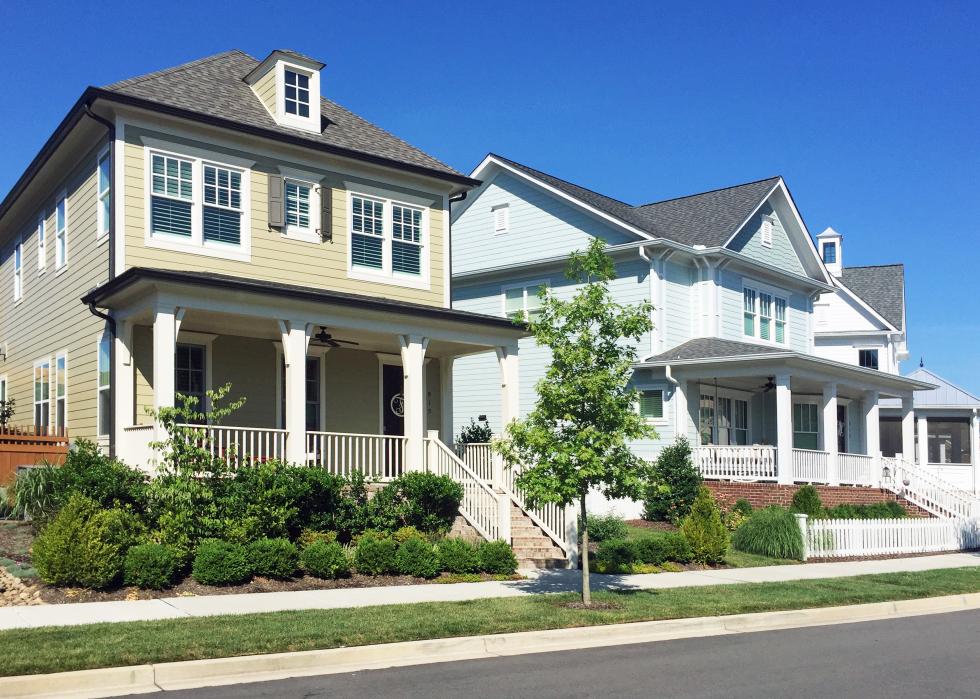
#15. Tennessee
- Effective real estate tax rate: 0.71%
- Annual taxes on $217.5k home: $1,548
- Tennessee's median home value: $167,200
- Annual taxes on Tennessee's median home: $1,190
Tennessee's real estate taxes are determined at the local level in this state, so low property taxes aren't uniform across the board. For example, homeowners in Memphis pay real estate rates that are about twice as high as the state average. Adding to the variation in tax rates is the fact that county appraisers are required to reassess the property in their counties every four to six years, which can cause homeowners to have regular increases in their tax bills.
But there are certain factors that help keep the tax rate low overall in this state. For starters, real estate taxes in Tennessee are not applied to the full market value, but the assessed value, which is equal to 25% of the market value for residential properties. Certain exemptions—as well a relatively low median home value overall in this state—help to keep the overall real estate tax rate low in Tennessee.

#14. Idaho
- Effective real estate tax rate: 0.69%
- Annual taxes on $217.5k home: $1,492
- Idaho's median home value: $212,300
- Annual taxes on Idaho's median home: $1,456
Real estate taxes in Idaho are determined annually at the county level based on the full market value of the property which should, in theory, translate to a high property tax rate in this state. It doesn't, though, thanks to a huge state homeowners exemption that exempts half the value of owner-occupied primary residences from property taxes, up to a limit of $100,000. What that exemption means for homeowners is that a house with a full market value of $200,000, that is owner-occupied, would be reduced to a value of $100,000, cutting the taxes in half for the owner. This massive exemption helps to greatly reduce the effective real estate tax rate in Idaho, making it one of the states with the lowest real estate tax rates in the country.
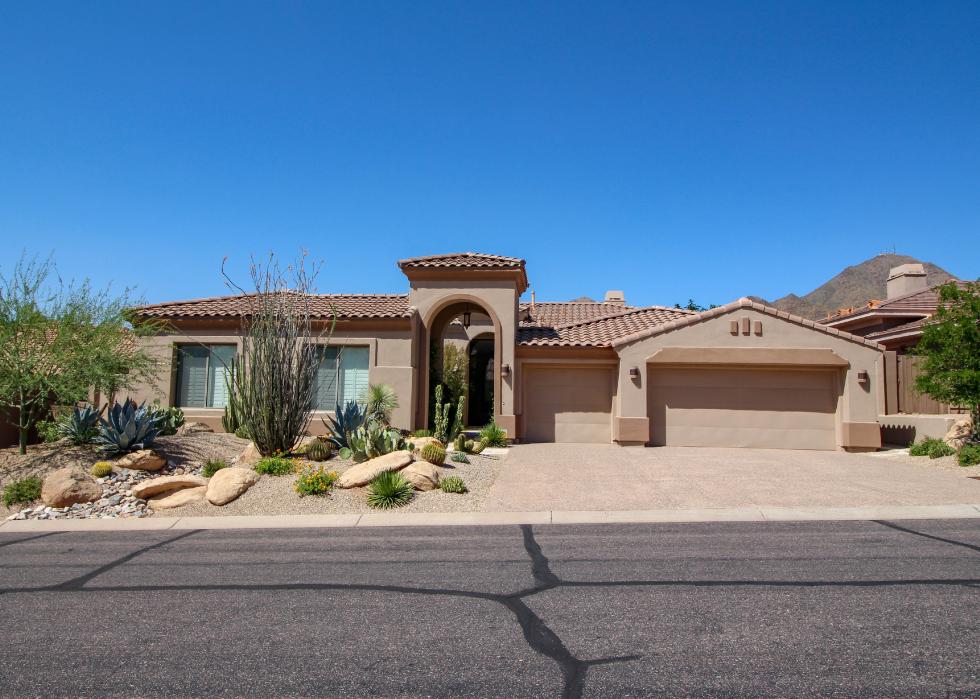
#13. Arizona
- Effective real estate tax rate: 0.66%
- Annual taxes on $217.5k home: $1,446
- Arizona's median home value: $225,500
- Annual taxes on Arizona's median home: $1,499
Homeowners in Arizona pay, on average, about $1,000 less each year than the rest of the nation. There are a few reasons for the low real estate taxes in this state. The first is that taxes are assessed by the county, district, and city based on the assessed value of the home, which in Arizona is just 10% of the limited property value. And, while tax rates in each county can change annually based on the needs of the local government, the total primary tax rate between all districts is limited to 1% of the property's limited value for owner-occupied housing, which means that any rates that exceed that will be reduced to meet the guidelines.
That 1% cap is what helps to keep Arizona's real estate property tax rate one of the lowest in the nation, making it much more affordable for homeowners in this state to cover their tax bills each year.

#12. Utah
- Effective real estate tax rate: 0.63%
- Annual taxes on $217.5k home: $1,362
- Utah's median home value: $279,100
- Annual taxes on Utah's median home: $1,748
Property tax rates in Utah are handled at the county level, and in each of Utah's 360 separate tax districts, residential property is assessed at a value that is equal to 55% of market value. That isn't what keeps Utah's tax rates at the bottom of the list, though. What helps to keep Utah's effective real estate tax rate lower than most of the rest of the nation is the Truth-in-Taxation law, which is a revenue-driven system that automatically lowers the property taxes in areas where the valuations of existing property have increased.
This reduction in property tax rates prevents local governments from automatically collecting more taxes just because the valuations of homes have increased, but that doesn't necessarily mean that the property taxes in these areas can't ever be increased. If local governments want to exceed the certified tax rate, they can go through the Truth-in-Taxation notification and hearing process—but in general, this automatic adjustment process is what keeps Utah's real estate taxes low across the board.
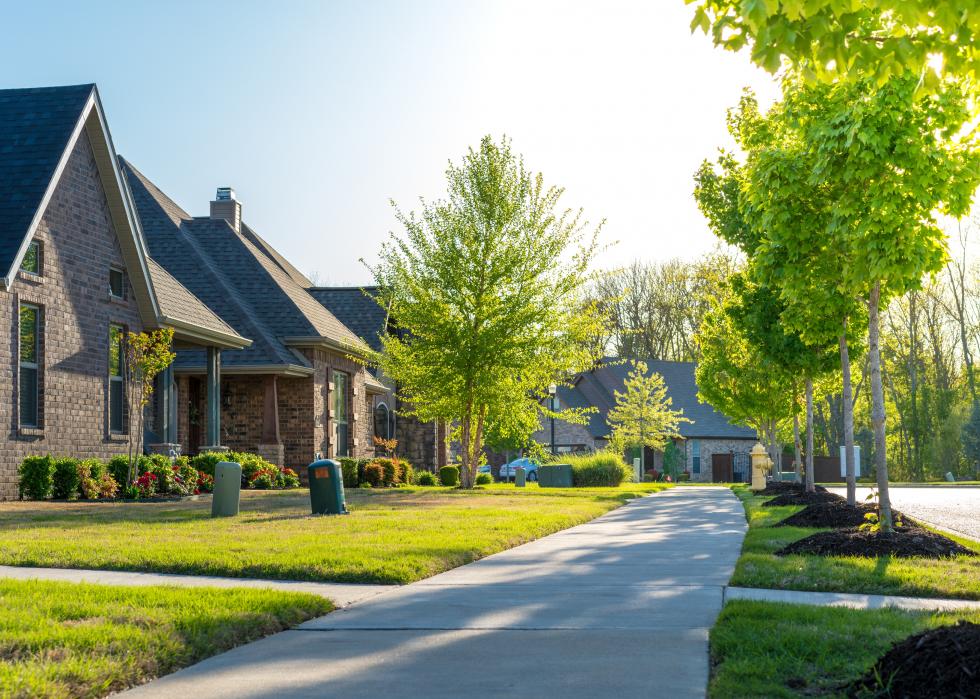
#11. Arkansas
- Effective real estate tax rate: 0.62%
- Annual taxes on $217.5k home: $1,358
- Arkansas's median home value: $127,800
- Annual taxes on Arkansas's median home: $798
Governing bodies in Arkansas calculate taxes for residential property quite differently than many other states. Arkansas real estate is taxed at the state, county, city, and school district level—and taxes are based on a property's assessed value.
What helps to keep the tax rate low in this state, though, is that the assessed value is equal to just 20% of the appraised value of a property—so a home worth $200,000 in Arkansas would only pay taxes on an assessed value of $40,000. And, considering that the median home value in Arkansas is much lower than that at just over $120,000, the 20% assessed value equates to extremely low real estate taxes in this state. Plus, other restrictions, which include a 5% limit on assessed value increases per year, help to keep the tax rate low in Arkansas year after year.

#10. Wyoming
- Effective real estate tax rate: 0.61%
- Annual taxes on $217.5k home: $1,319
- Wyoming's median home value: $220,500
- Annual taxes on Wyoming's median home: $1,337
Wyoming, where there is no state income tax, has become well-known as a tax haven for wealthy residents—and the real estate tax rate is no exception to this rule.
The reason real estate taxes are so low in Wyoming is that the state assesses residential property at just 9.5% of its fair market value, which means residents who own property in Wyoming are paying taxes on less than 10% of their fair market property value. This fair market value is assessed on the county level, and properties are only required to be physically inspected and reassessed every six years—so there are typically no annual valuation hikes to contend with.

#9. Nevada
- Effective real estate tax rate: 0.60%
- Annual taxes on $217.5k home: $1,310
- Nevada's median home value: $267,900
- Annual taxes on Nevada's median home: $1,614
You may be able to blow a ton of money in Las Vegas, but homeowners in this state don't have to roll the dice on real estate taxes.
Nevada has one of the lowest real estate tax rates in the nation, in major part because homeowners are protected from steep property tax increases by Nevada's property tax abatement law that limits annual property tax bill hikes to a maximum of 3% across the state.
There are other factors at play, too, including the fact that the assessed value of a home in Nevada is equal to just 35% of the taxable value. What that means is if the county assessor decides your home's taxable value is $200,000, you'll pay real estate taxes on just 35% of that value, or $70,000. When the low assessed value is coupled with the property tax abatement law, it equates to a very low effective real estate tax rate across the board for homeowners in Nevada.

#8. West Virginia
- Effective real estate tax rate: 0.58%
- Annual taxes on $217.5k home: $1,269
- West Virginia's median home value: $119,600
- Annual taxes on West Virginia's median home: $698
The median home value in West Virginia is pretty low compared to the rest of the nation, which helps to keep the effective real estate tax rate low in this state.
While the low median home value in West Virginia helps, it's certainly not the only thing that drives the low tax rate in this state. The fact that the assessed value of a home is equal to 60% of that appraised value in Virginia also helps, as taxes are paid on the assessed value, not the appraised value. What that means is this: If your home is appraised at $100,000 in West Virginia, you'll pay taxes on just $60,000 in assessed value. Plus, homeowners must be notified if the assessed value of their home increases by more than $1,000 or 10% in a given year, which gives them time to appeal the valuation and cut down on the tax bill they're paying. Those factors, coupled with the low standard for tax rates in West Virginia counties, mean homeowners in the state of West Virginia pay about half of the national average in property taxes.

#7. South Carolina
- Effective real estate tax rate: 0.57%
- Annual taxes on $217.5k home: $1,238
- South Carolina's median home value: $162,300
- Annual taxes on South Carolina's median home: $924
South Carolina is home to desirable areas like Myrtle Beach and Charleston, both of which are steeped in history and entertainment. The state is also home to one of the lowest effective real estate tax rates in the nation. Part of the reason the real estate taxes are extremely low in this state is that owner-occupied houses are assessed at a lower rate of just 4% when compared to other types of properties. What that means for homeowners in this state is that an owner-occupied home worth an appraised value of $100,000 would result in an assessed value of just $4,000—which is the amount the owner would be paying taxes on. That results in huge savings on owner-occupied tax bills, and other restrictions, like caps of 15% on increases in market value, help to keep the tax rates low across the state.
Tax rates vary by county in South Carolina, so some homeowners will pay much more than the state average for real estate taxes. But more generally, the rate residents of South Carolina pay is one of the lowest in the entire nation

#6. Delaware
- Effective real estate tax rate: 0.57%
- Annual taxes on $217.5k home: $1,240
- Delaware's median home value: $251,100
- Annual taxes on Delaware's median home: $1,431
Delaware is a tiny state, and the homeowners in the three counties that comprise this Northeast state are paying equally tiny real estate taxes each year on the properties they own. That's because while local governments are responsible for setting the tax rates for their counties, these local governments do not reassess property values on a regular basis. Rather, the property taxes are based on the values calculated the last time all property was reassessed—and it's common for counties in Delaware to go several decades without a reassessment.
Taxes paid by homeowners are not based on the full market value of the home; they're based on the assessed values, which are typically just a fraction of the full value. For example, in Kent County, the assessed values are equal to 60% of the 1987 market value, which means that homeowners in that county are paying taxes on just a fraction of the value that was determined several decades ago.

#5. District of Columbia
- Effective real estate tax rate: 0.56%
- Annual taxes on $217.5k home: $1,221
- District of Columbia's median home value: $601,500
- Annual taxes on District of Columbia's median home: $3,378
The median home value in Washington D.C. may exceed half a million dollars; but what the home prices lack in affordability, the District of Columbia makes up for in low effective real estate tax rates.
Annual assessments occur on properties in D.C., which would typically mean that homeowners are risking a hike in home value and their property taxes each year, but there are a number of property tax deductions and credits available to homeowners in this district to reduce their overall tax bills. For example, the Homestead Deduction, which is available for homeowners who reside in a residence with no more than five units, reduces the assessed value of the home by $75,700. Other deductions and credits, like the Senior Citizen or Disabled Property Owner Tax Relief program and the First-Time Homebuyer Individual Income Tax Credit, help to further reduce the cost of real estate taxes in D.C.—as does the Assessment Cap Credit, which protects homeowners from rapid home price increases and limits increases in assessed values to 10% per year.
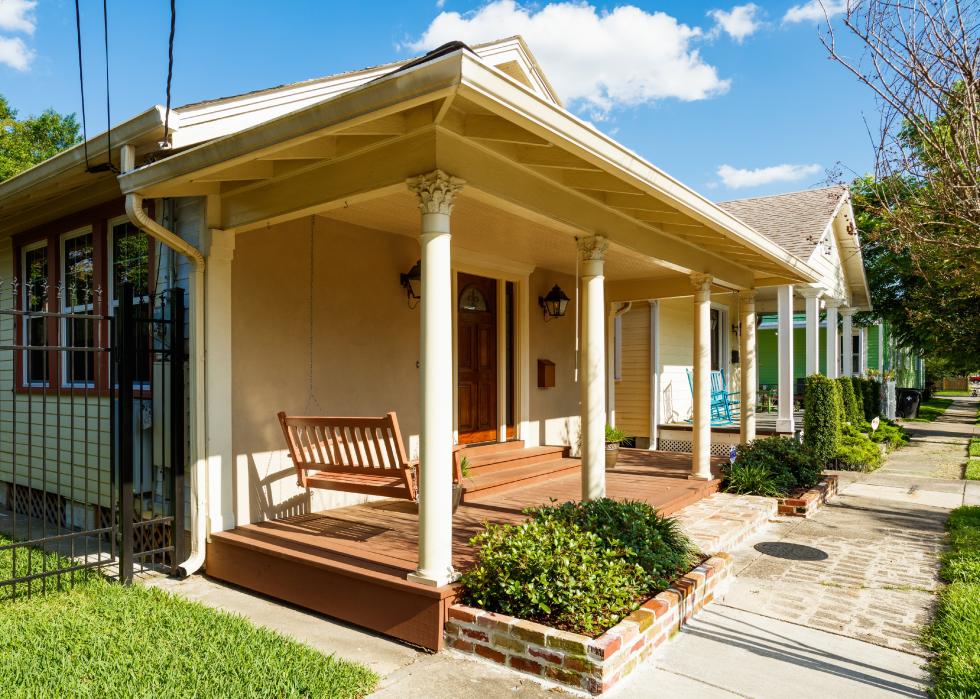
#4. Louisiana
- Effective real estate tax rate: 0.55%
- Annual taxes on $217.5k home: $1,187
- Louisiana's median home value: $163,100
- Annual taxes on Louisiana's median home: $890
There are several types of local government entities in Louisiana that can levy property taxes, and each tax authority has its own rates, which means that homeowners are being taxed by multiple entities each year. What's surprising about that is that while there are multiple entities levying property taxes, Louisiana's real estate tax structure still results in extremely low property tax rates for homeowners in this state.
Residential property in Louisiana is assessed at a value that is equal to 10% of market value, which means that a home with a full value of $100,000 would be taxed on just 10%, or $10,000. There are exemptions that help to further cut down on the real estate tax bills in this state, including the homestead exemption, which applies to owner-occupied primary residences and reduces the assessed value by $7,500. So, if a $100,000 home had an assessed value of just $10,000, claiming the homestead exemption would cut that value down to just $2,500. That results in extremely low property tax bills, even with several entities cashing in.

#3. Colorado
- Effective real estate tax rate: 0.51%
- Annual taxes on $217.5k home: $1,113
- Colorado's median home value: $343,300
- Annual taxes on Colorado's median home: $1,756
Colorado's median home value is a lot higher than some of the other states on this list, but the state's effective real estate tax rate is in the bottom three in the nation. What makes that low tax rate possible is the fact that property tax rates in Colorado do not apply to market value. They are applied to the assessed value, which is called the residential assessment rate, and the assessed value is just a fraction of the market value of your home.
The assessed value fluctuates in Colorado, but the most recent estimated assessed value rate for homes in the state is 7.15%. Plus, property in this state is valued in two-year cycles, which means that assessment hikes are limited to every two years—and there is a formal system in place for homeowners to protest valuations they disagree with. These factors help Colorado's real estate tax rate stay at the lowest of the low, despite the ever-increasing home prices in the state.
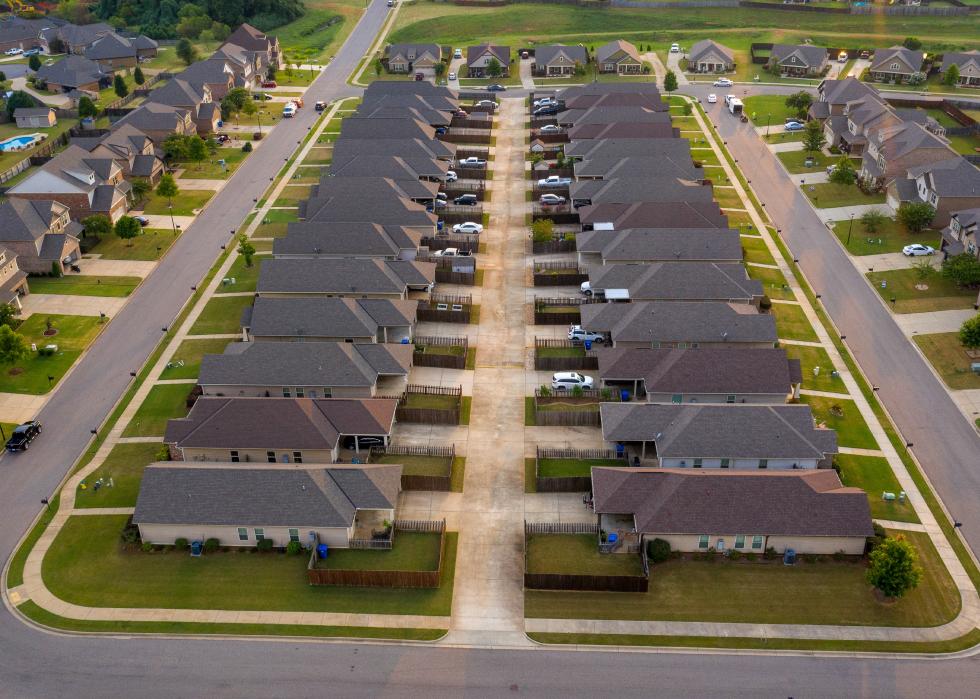
#2. Alabama
- Effective real estate tax rate: 0.41%
- Annual taxes on $217.5k home: $895
- Alabama's median home value: $142,700
- Annual taxes on Alabama's median home: $587
Homeowners in Alabama typically pay just one-fourth of what homeowners in the rest of the nation pay for property taxes. That's thanks in part, to homes in this state being taxed on just 10% of the home's market value. That said, the local counties, school districts, and municipalities set their own tax rates for homeowners, which means rates vary based on where you live in the state.

#1. Hawaii
- Effective real estate tax rate: 0.28%
- Annual taxes on $217.5k home: $606
- Hawaii's median home value: $615,300
- Annual taxes on Hawaii's median home: $1,715
The wondrous landscape of Hawaii may mean a higher median home value for homebuyers, but it doesn't equate to a high rate of real estate taxes for homeowners in this state.
Hawaii's low property taxes are due to generous exemptions offered to certain types of homeowners. One of the main exemptions is geared toward homeowners with owner-occupied residences. Homeowners who occupy their residences full time—i.e., homeowners that have properties that are not secondary or vacation homes—are eligible for exemptions that range from $80,000 to $160,000, depending on the county of residence. Each county in Hawaii sets its own real estate tax rates, but in general, these exemptions can greatly decrease the cost of real estate taxes for homeowners anywhere in the state—at least when it comes to owner-occupied properties.



